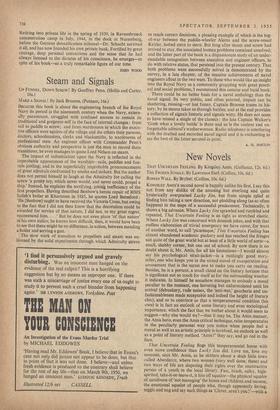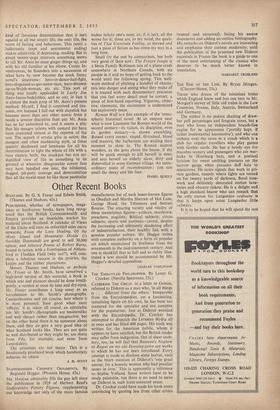New Novels
KINGSLEY Amis's second novel is happily unlike his first. I say this not from any dislike of the amusing but overlong and quite hysterically overpraised Lucky Jim, but from simple relief at finding him taking a new direction, not plodding along (as so often happens) in the steps of a successful predecessor. Technically, it shows a big advance. Where Lucky Jim sprawled and rumbled and repeated, That Uncertain Feeling is as tight as stretched elastic. Where Lucky Jim was concerned with donnish jokes, and with that endless elaboration of trivial emergency we have come, for want of another word, to call 'picaresque,' That Uncertain Feeling has almost abandoned academic puckery and has reached the fringes not quite of the great world but at least of a little world of sorts—a small, shabby corner, but one out of school. By now there is no doubt about it, Mr. Amis, for all his limitations—I would almost say his psychological strait-jacket—is a rattlingly good story- teller, one who keeps you in the mixed mood of exasperation and amusement that is the surest one to make you carry on reading. Besides, he is a portent, a small cloud on the literary horizon that is significant not so much for itself as for the surrounding weather it indicates. In himself he somehow manages to embody a mood peculiar to the moment, one hovering but unformulated until his arrival (debunkery, rude noises, the 'anti-wet,' gaucherie and un- fashionableness made acceptable and indeed the height of literary chic), and so to convince us that a temperamental condition (his own) is in fact an outlook of some literary and even sociological importance, which the fact that we bother about it would seem to suggest—why else would we?—that it may be. The Amis manner, the Amis hero, even the Amis critical technique, raise temperatures in the peculiarly personal way you notice when people feel a moral as well as an artistic principle is involved, an outlook as well as a point of literary method. 'Amis?' they say, and go red in the face.
That Uncertain Feeling flogs this temperamental horse with even more confidence than Lucky Jim did. Love me, love my neurosis, says Mr. Amis, as he skitters about a drab little town called Aberdarcy, where two women (very well done, these) and two ways of life are disputing their rights over the unattractive person of a youth in the local library. Fast, brash, sulky, high- spirited, take-it-or-leave-it, it hits off squalor—the physical squalor of untidiness of 'not managing' the house and children and income, the emotional squalor of people who, though apparently loving, niggle and nag and say such things as 'Clever, aren't you?'—with a
kind of ferocious determination that it isn't squalid at all but simply life, the only life, the norm of feeling and behaviour. This (until a ludicrously inept and sentimental ending) makes admirable, if depressing, reading. But at about twenty-page ,intervals something seems to tell Mr. Amis he must ginger things up, and with his old familiar at his elbow, Comic In- ventiveness, he flounders into a succession of what have by now become the stock funny novel's situations : hero-in-dance-hall-fight, hero-disguised-as-gas-meter-man, hero-dressed- up-as-Welsh-woman, etc. etc. This sort of thing was loudly applauded in Lucky Jim (hero-burns-bedclothes, and so on); in fact it is almost the main prop of Mr. Amis's present method. Myself, I find it contrived and tire- some, not because I fall out with slapstick but because more than any other comic form it needs a severer discipline than any Mr. Amis has so far submitted to, and it seems a pity that his meagre talents with custard pie have been overrated almost at the expense of the rest. The superb if erratic gifts in satire; the pungent and often maddening style, at times queerly shadowed and luminous for all his determination to light the whole of life with a bare electric bulb; the crackpot but not un- dignified view of life as something to be grinned at whatever disagreeable corner fate may have bundled one into; the blinkered, dogged, pit-pony courage and determination that all the world must be like those particular inches before one's nose, or, if it isn't, all the worse for it; these are, to my mind, the quali- ties of That Uncertain Feeling, as shrewd and taut a piece of fiction as has come my way in a long time.
Small fry the rest by comparison, but both very good of their sort : The Frozen Jungle is a Swiss Family Robinson tale of a plane crash somewhere in Northern Canada, with six 'people in it and no hope of getting back to the world until the following spring. This well- worn method of pitching a handful of charac-, ters into danger and seeing what they make of it is treated with such documentary precision that you feel every detail must be correct, a piece of first-hand reporting. Vigorous, objec- tive, cinematic, the excitement is understated but explosively tense.
Roman Wall is a fine example of the 'atmo- spheric historical novel. At an outpost near what is now Lausanne the Roman world of the second century—its values, its discipline, even its garden statuary—is shown crumbling. Round every corner, stupid, ill-trained, blond and massive, the barbarians are waiting their moment to close in. The Roman matron wonders, as she goes about the house, if she will be quick enough to kill herself in time, and sees herself an elderly slave, dirty and dishevelled in some German village. An extra- ordinary piece of reconstruction: you can smell the decay and the fear.
ISABEL QUIGLY



































 Previous page
Previous page